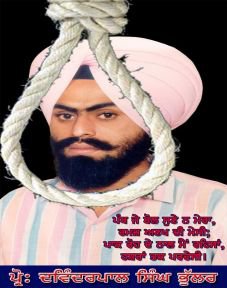Born on May 26th, 1965 in a small town of Punjab, Devinder Pal Singh Bhullar must have never in his worst nightmare thought that one day he will represent that face of India which would not only horrify the whole world but also bring tears in the eyes of fellow Indians. A well-read teacher of engineering, he was convicted for a bomb blast in Delhi that happened in 1993. He was declared guilty under a legislation which flouted human rights norms to the extremes- Terrorism and Disruptive Activities (Prevention) Act(Act No. 28 of 1987)
(Amended by Act 43 of 1993) . In a spilt decision, he was sentenced to death by hanging. This decision till date remains one of the most controversial decision ever. Let us, in the light of these thoughts discuss what really happened and what mistakes were made, what laws were broken and what wounds were given, wounds which can never heal.
The “Crime”.
On September 11, 1993, a car explosion took place outside Maninder Singh Bitta’s office. This blast killed nine people and two of Bitt’s body-guards[1]. It was a popular belief then that Bitta who was a very vocal critic of Khalistani ideologies was the primary target. Bitta survived the attack though, with shrapnel wounds to his chest.
As a result of investigations, Bhullar was held to be the person responsible for the whole act. It was held that he was a part of a terrorist organization named Khalistan Liberation Force. His friends and family, however deny this even today.[2]
In a bench of three judges, only one judge upheld that Bhullar couldn’t be convicted since too much doubt was there in relation to his actual participation. The other two judges however upheld that Bhullar was guilty and “beyond reasonable doubt” should only be a guideline and not a rule. The basis of this conviction was his confession which was obtained under pressure and fear. Here section 25 of the Evidence Act was boldly sidelined and a judgment based on the fancies of the judges was delivered.
The German refuge
After the bombing took place, Bhullar fled India to take political asylum in Germany in 1994. His refuge was rejected by the German government in 1995 and he was extradited back to India to face the charges. This was done with an assurance that Bhullar would receive a fair-trial and would not be awarded death penalty in any case. But, a blow on the face of justice was given when Bhullar was not only treated as a terrorist, but was also prosecuted under the Terrorism and Disruptive Activities Act. (TADA).
Procedural Misconduct
- FAULTY CONFESSION
The “confession” that was taken from Bhullar, as alleged by the police was a voluntary one which was typed while he narrated his guilt. But funnily, the secretary who was typing the confession forgot to save it, as claimed by the police. TADA requires that whenever a confession is made, it should be hand-written or should be recorded (audio or video). Typed confessions are not relied upon in the court of law, but in this case, an exception was made.
- PROSECUTIONAL ERROR
Next, Bhullar was taken to the “executive magistrate” directly and the requisite of TADA which says that confession document is to be sent to the magistrate before the accused is presented so that the document can be extensively examined, was laughed upon and completely disregarded. On being questioned by the magistrate about his confession, Bhullar clearly submitted before the magistrate that his confession was not at all voluntary and was a result of torture and fear of death.
- PARTIAL JUDICIARY
Even when the Additional Sessions Judge held that there was no evidence against Bhullar that links him with the other alleged crimes he later came to be accused of while waiting for the death sentence, his plea was not heard and later his review petition was also dismissed on December 17, 2002. Bhullar then moved a curative petition, which too was rejected by the Apex Court on March 12, 2003.
- ABUSE OF LAW
On 27th December, 2006, Bhullar’s appeal against his conviction was rejected by the Supreme Court of India and so was his mercy plea by the President of India in May 2011.
- Later in his second appeal (unprecedented), Bhullar prayed that his death sentence be commuted to life imprisonment since his first appeal should’ve been heard by a Constitutional Bench of the Supreme Court rather than a Trial Bench. He also prayed that his death sentence was upheld by a 2-1 split and inordinate delay in his execution made him lose his mental balance. This too was not entertained well and his death sentence was upheld in April 2013.[3]
Recent developments.
On January 31st, 2014 the Supreme Court of India at last gained consciousness and realized that a man who has undergone such injustice that even the evil would shudder, deserves at least to be heard once. It thereby issued notice to the Central Government that his death sentence be commuted to life-imprisonment owing to his poor mental health and inordinate delay in his execution.[4]
The ones who could see the injustice that was being done.
The European Parliament passed a resolution stating that India must abolish death penalty and grant clemency to Bhullar.[5]
Amnesty International also took up the cause and launched an “Urgent Appeal” against the execution.[6]
Arvind kejriwal during his tenure as the Chief Minister of Delhi had written to the President of India recommending clemency for Devinder Pal Singh Bhullar.[7]
In Conclusion questions that STILL remain unanswered are:
- Why was Devinder Pal Singh Bhullar convicted when there was a lack of evidences against him?
- Why did the judiciary fail to treat a confession taken under undue influence and torture as null and void?
- Why was Devinder Pal Singh Bhullar not given a chance to exercise his right to be heard and represented?
- Why was a split bench decision not revised?
- Why was his first appeal not heard by a Constitutional Bench of the Supreme Court but instead by a Trial Bench?
- Why was there inordinate delay in deciding his mercy plea by the President of India?
- And lastly and more importantly, why is he still in jail even after two decades when he has not been found guilty beyond reasonable doubts?
[1] A Car Bomb in New Delhi Kills 8 Wounds 36″. New York Times. 1993-09-12. Retrieved 2011-07-26
[2] http://www.indianexpress.com/news/ludhiana-college-remembers-a-quiet-village-boy-with-no-leadership-qualities/1104243/
[3] Mahapatra, Dhananjay (2013-04-12). “Devinderpal Singh Bhullar to hang, SC refuses to commute his death penalty to life sentence”. Times of India. Retrieved 2013-04-12.
[4] http://news.biharprabha.com/2014/01/supreme-court-issues-notification-to-central-govt-on-bhullars-plea/ IANS. Biharprabha News. Retrieved 31 January 2014.
[5] http://www.europarl.europa.eu/sides/getDoc.do?type=MOTION&reference=B7-2011-0395&language=EN Europarl.europa.eu. Retrieved on 2013-04-16
[6] http://punjabnewsline.com/news/Amnesty-International-urges-people-to-appeal-for-death_row-convict-Bhullar.html Bhullar Punjab News. Punjabnewsline.com. Retrieved on 2013-04-16
[7] http://ibnlive.in.com/news/arvind-kejriwal-seeks-clemency-for-khalistani-terrorist-bhullar/448555-37-64.html




